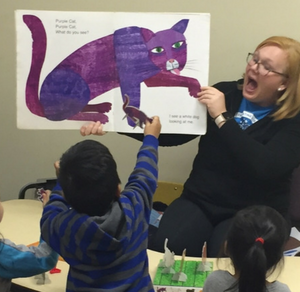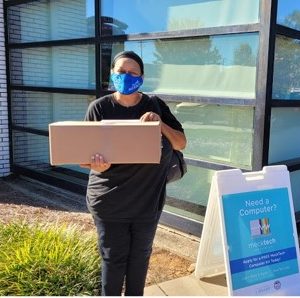“These programs are fundamentally about access.”
Ten program participants cut pictures from magazines and glue them to paper plates, making fans on a hot summer day as Michael Jackson’s music videos play in the background. Some trade pictures of favorite animals. About half work alone, others need encouragement or assistance from Library staff member Cathy Fletcher. She navigates the room with familiarity and confidence, evidence of the relationships she’s developed over two years of offering these weekly programs for adults living with sensory, memory, mobility or developmental challenges. This is a room of friends.
Nancy Collins’ 23-year-old son Damien calls the group his “Library friends.” Damien has low vision and hearing, so programs that appeal to multiple senses are very important. Nancy notes that there aren’t many places where Damien feels comfortable and welcomed, which can be very isolating for both of them. “I love that the Library offers this. He gets happy and excited to go see his Library friends, and he knows this program is what that means. There are very few free opportunities that allow him to be part of a community, to learn and to grow. This is so important and valuable for us.”
Charlotte Mecklenburg Library’s adult sensory programs began when Library staff recognized the lack of opportunities for this population. Several years ago the Library introduced sensory storytimes for children on the autism spectrum. Cathy Fletcher recalls wondering what the Library offers for people who age out of the children’s programs. The answer seemed obvious to her, “Main Library is an adult library. I thought, why not start a program here?” Library leadership was immediately supportive, and the program was born two years ago.
A small group of librarians trained with Library outreach staff serving adults, and learned more about programs for children. They adapted a similar structure for adults – incorporating children’s books that are amusing for adults, as well as games like bingo, musical chairs, colors, painting and clay to develop both gross and fine motor skills. Staff are always sensitive to the varied abilities and age ranges within each group, and look for opportunities for engagement at every level. Programs include music, movement, stories, crafts and subject matter designed to trigger conversation. Participation and social interaction are the primary goals, and the experience has been well-received by individual families, group homes and social service organizations. Cathy estimates Main Library’s program attendance at ninety adults each month.
The program has expanded throughout the Library system, and the small team recently organized a retreat for staff from all locations to share materials, ideas and best practices. Overwhelmingly, staff and managers at every location have seen their communities welcome adult sensory programs, and have quickly attracted regular attendees. David Singleton, Director of Libraries, observes “These programs are fundamentally about access, about serving our whole community, and about connecting people with resources, with each other, and with the Library. There is a sense of welcome and inclusion at the Library, and this is a wonderful expression of our mission to improve lives and build a stronger community.”
The smiles on the faces of program participants – and the high fives many give to Library staff as they work – are the best review of the program’s impact. Linda, a regular attendee at Main Library, explains “I like Cathy and I like a clean library, I like the arts and crafts, sewing, she’s going to bring me some thread, I like making purses and hats and sewing baskets. I like coming here.” Linda’s caregiver confirms that the Library program really brightens and breaks up her client’s day.
And it brightens the Library too. Cathy Fletcher notes, “I love this population. They are very underserved, and they are wonderful and never complain. You can’t leave these programs in a bad mood. This is something I probably should have been doing my whole life, and I’m so glad to be part of it.”



